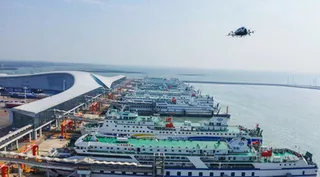Poll Finds Aviation’s Full recovery May Take 3 Years
Contact Our Team
For more information about how Halldale can add value to your marketing and promotional campaigns or to discuss event exhibitor and sponsorship opportunities, contact our team to find out more
The Americas -
holly.foster@halldale.com
Rest of World -
jeremy@halldale.com

The commercial aviation industry’s rebound from COVID-19 is underway, with the number of airline flights starting to gradually increase, but widespread recovery could take several years. This is the consensus from a major industry poll conducted as part of FlightPlan: Charting a Course into the Future, an online broadcast by Inmarsat and the Airline Passenger Experience Association (APEX). Despite bracing for a slow recovery, the poll reveals a sense of optimism for the industry’s future, with digitisation expected to drive the return to profitable growth.
The poll – completed by more than 500 professionals from across the global aviation industry between April and June 2020 – shows that more than half of respondents (60%) expect a recovery period between 18 months to three years. Only 13 percent said they believe the industry was prepared for a crisis like COVID-19.
Domestic travel is expected to bounce back quickest from the current crisis, with almost nine in 10 (85%) predicting it will recover quicker than international travel, which is still impacted by factors such as border restrictions and quarantines.
Seven out of 10 respondents expect point-to-point travel will bounce back quicker than hub and spoke routes, with low-cost carriers (LCCs) expected to recover more quickly than full service carriers (55% vs 45% respectively). Whilst commentators initially suggested that the rise of remote working would be detrimental to business travel, 69 percent of respondents expect a swifter recovery for business travel than leisure travel.
Despite bailouts from many governments, only 7 percent of respondents believe governments have uniformly done enough to support the industry, suggesting that whilst the crisis is global, the response actions at a national level have been varied. At the heart of bailout discussions is an international debate on the future of sustainable aviation. In recent weeks, several European air transport associations came together in a call for the prioritisation of specific decarbonisation initiatives in the allocation of funding to help airlines recover from COVID-19[1]. With a global recession potentially threatening investment in green technology, there was little consensus in the poll about the impact of COVID-19 on aviation’s path to sustainability, with 36 percent believing the crisis will accelerate progress and 47 percent thinking it will delay progress.
New health and safety guidance from aviation industry bodies such as APEX and IATA – including enhancing the traceability of customers and establishing clear aircraft decontamination procedures[2] – has driven necessary changes to passenger journeys. As a result of deeper cleaning measures, 9 in 10 (88%) expect slower turnarounds, which could have a significant impact on flight schedules. Contactless catering was highlighted by 57 percent as being important during the recovery period, and almost half (44%) expect to see empty middle seats as a common feature of the passenger journey in the coming months despite contrary guidance given by IATA in May.
Despite the financial impact that many airlines are facing, almost half of respondents (45%) believe that in terms of passenger experience, the crisis will only cause a short-term reduction in investment, and almost a third (32%) believe there will be an overall increase in investment. There was agreement that the adoption of digital and connected technologies will drive recovery, with data analytics, biometrics, artificial intelligence (AI) and the internet of things (IOT) set to have the greatest influence on future profitable growth.
Philip Balaam, President of Inmarsat Aviation, said: “The immediate priority for airlines and the wider aviation industry is clearly surviving the unprecedented impact of COVID-19. Aviation is taking its first steps towards a recovery and it is encouraging that many in this industry have been proactive in adapting and planning for the future. These survey results, together with the numerous discussions and debates during FlightPlan, indicate that the COVID-19 crisis may prove a decisive moment for digital transformation in an industry that’s historically been behind the curve, with the vast majority of aviation professionals expecting digital technologies to help drive a stronger return towards profitable growth.”
[1] https://www.iata.org/en/pressroom/pr/2020-06-24-01/
[2] https://apex.aero/20/03/04/apex-best-practices-covid-19


